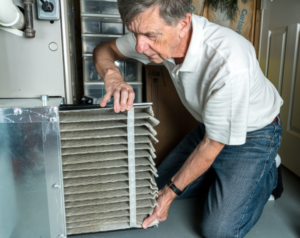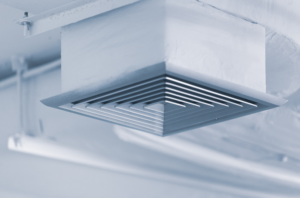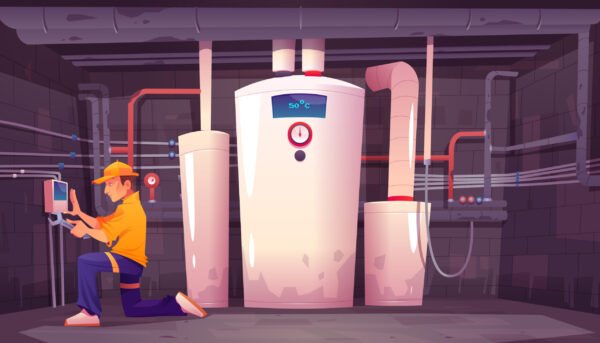If you’ve ever wondered how to improve basement air quality, you’re not alone.
Basements are often neglected when it comes to maintaining good air quality, but they play a crucial role in your home’s overall well-being.
Improving the air quality in your basement is essential for the health and safety of your family.
To improve air quality, it is important to keep your basement windows closed, ventilate the basement with a dehumidifier or air purifier, dry out the basement to prevent mold and mildew growth, and seal all cracks and gaps. On your own, you can keep windows closed, invest in a dehumidifier or air purifier, and dry out the basement.

In this comprehensive guide, we’ll delve into various strategies and techniques to help you breathe easier in your basement.
Interesting Topic: Self Car Wash: How To Use it
A Guide to Better Basement Air Quality

Basements are often overlooked when it comes to home maintenance, but they can be a breeding ground for mold, mildew, and other pollutants. Poor basement air quality can lead to a variety of health problems, including allergies, asthma, and respiratory infections.
The good news is that there are a number of things you can do to improve basement air quality. Here are a few tips:
- Reduce humidity. Humidity is a major contributor to mold growth. You can reduce humidity in your basement by using a dehumidifier. Aim to keep humidity levels between 30 and 50 percent.
- Improve ventilation. Basements often lack proper ventilation, which can lead to stale air and the accumulation of pollutants. You can improve ventilation by opening basement windows and doors or by installing a ventilation system.
- Seal cracks and gaps. Cracks and gaps in your foundation and walls can allow moisture and pollutants to enter your basement. Seal these cracks and gaps with caulk or sealant.
- Clean your basement regularly. Vacuum and mop your basement regularly to remove dust, dirt, and other allergens.
- Remove sources of mold. If you have mold in your basement, remove it as soon as possible. You can use a mold cleaner or hire a professional mold remediation company.
Tips for Enhancing Your Basement’s Air

In addition to the tips above, there are a few other things you can do to enhance your basement’s air quality:
- Use an air purifier. An air purifier can help to remove pollutants from the air, such as dust, pollen, mold spores, and smoke.
- Grow plants. Houseplants can help improve air quality by filtering out pollutants and releasing oxygen.
- Avoid using chemicals. Avoid using harsh chemicals in your basement, as these can release harmful VOCs (volatile organic compounds).
Your key to a healthier basement

By following these tips, you can improve the air quality in your basement and create a healthier living space for you and your family.
Basement Mold Prevention Strategies
Mold is a common problem in basements, but it can be prevented. Here are a few tips:
- Keep your basement dry. Mold needs moisture to grow. Reduce humidity in your basement by using a dehumidifier and fixing any leaks.
- Improve ventilation. Mold spores can thrive in stagnant air. Improve ventilation by opening basement windows and doors or by installing a ventilation system.
- Clean your basement regularly. Vacuum and mop your basement regularly to remove mold spores and other allergens.
- Remove sources of mold. If you have mold in your basement, remove it as soon as possible. You can use a mold cleaner or hire a professional mold remediation company.
Interesting Topic: How To Improve 1.5-mile run Time in a month
Improving Airflow in Your Basement
Airflow is important for good basement air quality. Here are a few tips for improving airflow:
- Open basement windows and doors. When the weather permits, open basement windows and doors to let in fresh air.
- Install a ventilation system. If your basement doesn’t have proper ventilation, you may want to consider installing a ventilation system. This will help circulate fresh air throughout your basement.
- Use fans. You can also use fans to improve airflow in your basement. Place fans in strategic locations to circulate air and remove stale air.
Dehumidifying your basement
Excess humidity can lead to mold growth and other problems in your basement. Here are a few tips for dehumidifying your basement:
- Use a dehumidifier. A dehumidifier will remove moisture from the air in your basement. Aim to keep humidity levels between 30 and 50 percent.
- Fix any leaks. If you have any leaks in your basement, fix them as soon as possible. Leaks can contribute to high humidity levels.
- Improve ventilation. Improved ventilation will help to remove moisture from your basement. Open basement windows and doors when the weather permits, or install a ventilation system.
Purifying the Air in Your Basement
An air purifier can help to remove pollutants from the air in your basement, such as dust, pollen, mold spores, and smoke. When choosing an air purifier, be sure to select one that is the right size for your basement.
Transform your basement into a healthy living space.

You can improve your basement air quality and transform it into a healthier living space for you and your family. Here are some helpful home remedies for mold removal and improving air quality in the basement:
- Hydrogen Peroxide: This is a reasonably aggressive substance, but it is used in many cleaning products (bleach, medicinal solutions, etc.). Hydrogen peroxide is also perfect for fighting mold, but just like methylated spirits, it is a minor source of danger to your health if the appropriate precautions are not taken. Thick household gloves, a breathing mask, and a ventilation option should be available.
- High-proof alcohol: You can buy high-proof alcohol solutions in drugstores, pharmacies, or sometimes in well-stocked supermarkets, which are an ideal way of removing mold cultures. Make sure the alcohol is at least 70% strong and is applied gently with a rag. Since it evaporates quickly in the air, it is also ideal for basements with poor ventilation.
- Vinegar: Vinegar is a household remedy often mentioned, but it can only help against mold on metal or tiles. For example, if it is used on walls, its effect often fizzles out because it is neutralized by building materials such as lime. In the worst case, it even transfers nutrients to the mold, which can thrive even faster.
Know about improving your FM radio signal.
Conclusion
At the end of our ultimate guide on how to improve basement air quality. The basement should be clean and have good air quality.
How to make the basement air fresh! Watch for any signs that there might be a problem in your basement, and continually improve the air quality in your basement by following the tips we provided in this article. Don’t hesitate to ask for help.
FAQs
Do basements need air purifiers?
Yes, basements can benefit from using an air purifier. Basements are often prone to mold growth, dust, and other pollutants. An air purifier can help remove these pollutants from the air, making your basement a healthier and more enjoyable space.
How do you naturally ventilate a basement?
There are a few ways to naturally ventilate a basement: Open basement windows and doors when the weather permits. Install a basement fan or ventilator. Plant trees and shrubs around your foundation to help shade your basement and reduce heat buildup. Build a sump pump to collect and remove groundwater from your basement.
What can I use for basement air?
A dehumidifier is a great way to improve basement air quality. Dehumidifiers remove moisture from the air, which can help prevent mold growth and other problems. An air purifier is also a good option for improving basement air quality. Air purifiers remove pollutants from the air, such as dust, pollen, mold spores, and smoke.
How do you air-condition a basement?
There are a few ways to air-condition a basement: Install a central air conditioning system. Install a window air conditioner. Install a portable air conditioner. If you have a finished basement, you may want to consider installing a central air conditioning system. This is the most effective way to air-condition a basement, but it is also the most expensive. If you have an unfinished basement or are on a budget, you may want to consider installing a window air conditioner or a portable air conditioner. These options are less expensive than central air conditioning, but they are also less effective.
How do I air-condition my basement room?
If you have a finished basement room, you can air-condition it using a window air conditioner or a portable air conditioner. Be sure to choose an air conditioner that is the right size for your room.
Do dehumidifiers improve air quality?
Yes, dehumidifiers can improve air quality by removing moisture from the air. Moisture can contribute to mold growth, dust mites, and other allergens. Dehumidifiers can help reduce these pollutants, making your indoor air cleaner and healthier.
Do dehumidifiers reduce air quality?
Dehumidifiers can reduce air quality if they are not properly maintained. Dehumidifier filters can become clogged with dust and mold, which can release pollutants into the air. Be sure to clean your dehumidifier filter regularly to prevent this from happening.
What are the disadvantages of air purifiers?
Air purifiers can be expensive, and they require regular maintenance. Air purifier filters need to be replaced periodically, depending on the frequency of use. Air purifiers can also be noisy, and they may not be effective at removing all pollutants from the air. Overall, the benefits of using an air purifier outweigh the disadvantages. Air purifiers can be a great way to improve air quality in your home, especially in areas that are prone to pollution.

